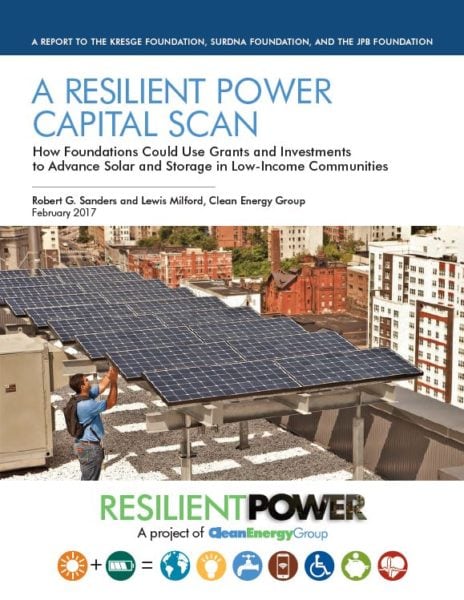A Resilient Power Capital Scan: How Foundations Could Use Grants and Investments to Advance Solar and Storage in Low-Income Communities
February 1, 2017
Lew Milford, Robert Sanders | Clean Energy Group
This report, commissioned by The Kresge Foundation, the Surdna Foundation and The JPB Foundation, identifies market barriers to deploying solar+storage technologies in low-income markets, and proposes more than 50 grant and investment opportunities that socially minded investors can use to target those barriers.
The report identifies five market barriers to integrating solar+storage in low-income communities:
- The need for an integrated development finance model to overcome finance gaps in underserved markets.
- Lack of internal capacity of portfolio owners, advocates, and public officials to develop solar+ storage projects.
- Insufficient energy data collection, policy research, and economic analysis to understand the development of solar storage technology in low-income markets.
- Insufficient capacity of technical service providers, project developers, and nonprofit intermediaries to reach underserved communities.
- Inadequate market rules, incentives. and regulatory policies to advance new solar+storage technologies in low-income markets.
The report recommends a broad palette of options for foundations interested in different market efforts. Among the proposed interventions that foundations can undertake are the following:
- Support New Tax Credit Aggregation Entity. There is a need for the creation of new legal entities to aggregate multiple portfolio owners’ solar and storage tax credits to create a scaled investment opportunity for investors.
- Provide Credit Enhancement for Performance Risk. There is a need for credit enhancement for investors and building owners to reduce technology and performance risk (e.g., “performance loss reserves” to reimburse monetary losses from unrealized economic benefits).
- Provide Working Capital. Fund predevelopment costs and bridge the payment of developers’ fees that are often tied up in multiple projects.
- Provide Long-term Capital. Provide 10-year term capital to take out construction financing (preferably with a 15-year amortization) and as a capital source for on-bill payment programs.
- Fund Leadership Awards to Owners. Provide funding (“Leadership Awards”) to portfolio owners through nonprofit intermediaries for offsetting the organizational costs and new predevelopment costs of first-time solar+storage projects (e.g., technical and legal review, doc prep, assembling additional development team members, compliance, etc.).
- Invest for LMI Expansion. Invest in existing companies active in solar+storage development in the commercial space to expand reach into low-income markets.
- Fund LMI Advocates. Support advocacy organizations to provide information and training to LMI residents on issues regarding resilient solar+storage benefits with the goal of increasing LMI participation in policy discussions.





